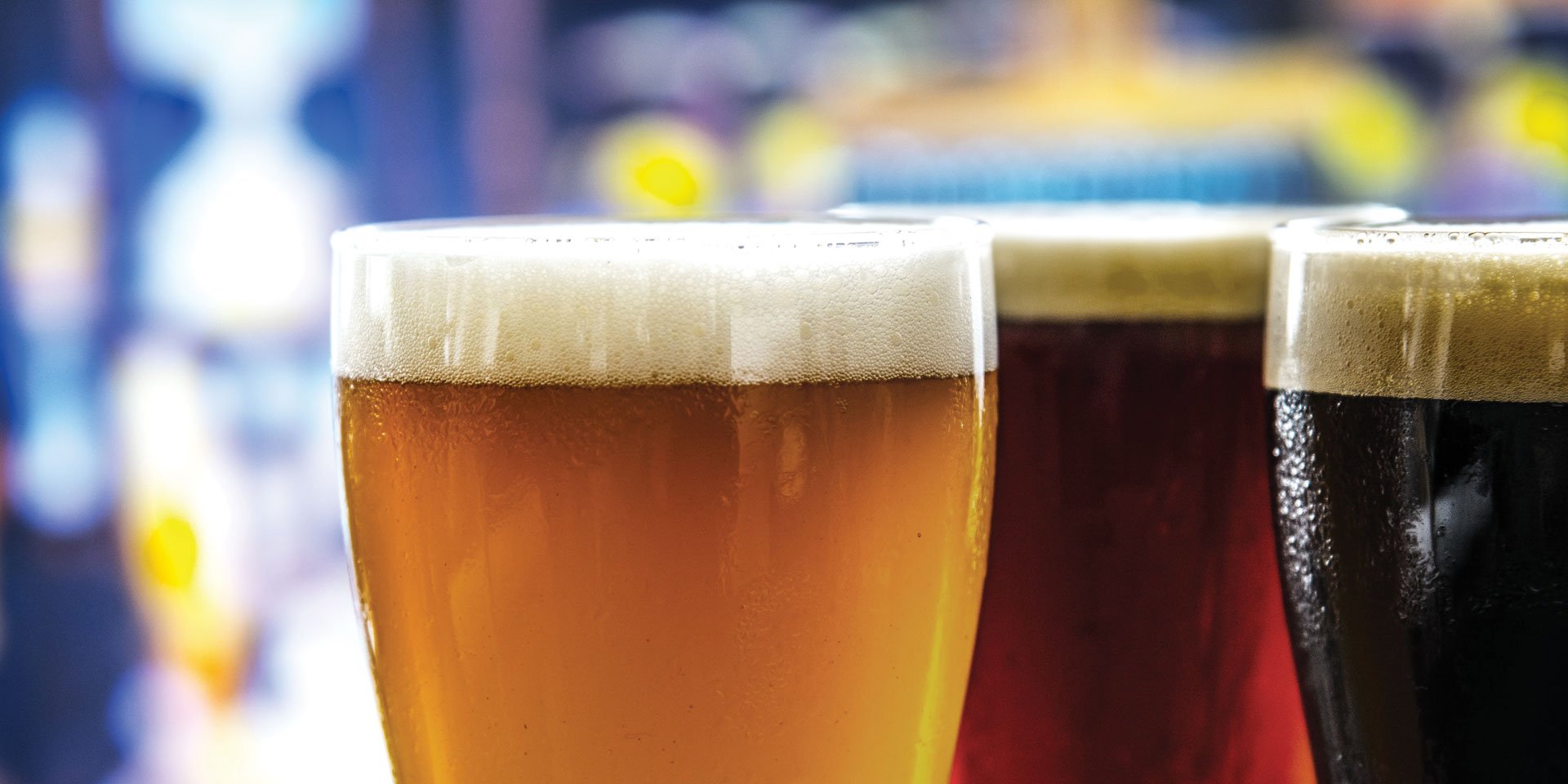Traditional Brewing by Country
Moving to the continent, our next stop on this world tour via beer is Germany and the Czech Republic. Whether a traditional lager, a golden wheat beer, or a Rauchbier , grab your steins and join us.
German/Czech Brewing: The Land of Lagers
Traditional Lagers: Helles, Pils, Export, Fest, Schwarz, Bock, Doppel Bock
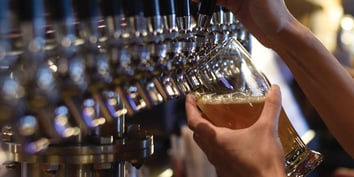
Lagers are the main beer style produced in central Europe. Germans perfected the art of cold storing [lagering] their beers, selecting out bottom fermenting yeast strains in the process. When lakes froze over, ice would be cut by saw, hauled to breweries and stored in caves or cellars where the beer would continue to age through warmer weather. Golden beers like Helles, Export and Pilsner developed in this manner and became popular as refrigeration allowed for controlled temperatures. Helles is a Bavarian tradition, Export developed in Dortmund, while a town in the Czech Republic gave us the hoppier Pilsner, meaning “from the town of Plzen”, all three of medium strength. In the deep golden/amber category, Oktoberfest/Festbier for the fall is now the standard for malty, medium strength, copper colored lagers. The black lager Schwarzbier is also of medium strength, low hopping, but has a distinct roasted flavor from black malt. On the high end of the alcohol scale, Germans make Bock and Doppel Bock, both malty and amber. Originally from the town of Einbeck, Bocks are brewed all over Germany, usually at 6.0-6.5% ABV for Bock and 7.0-8.0% ABV for Doppel Bock.
Wheat Beers: Hefeweizen, Berliner, Gose, Dunkel, Weizenbock
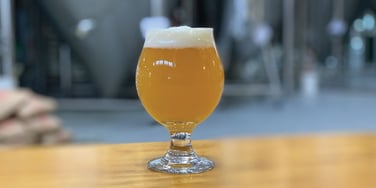 Beers made from 40-50% malted wheat, unfiltered and fermented with wild yeast are called Hefeweizen, Hefe meaning yeast and Weizen meaning wheat. These beers have a spicy or phenolic character from the yeast and are normally hazy golden. A cousin of the style is the very pale golden, Berliner Weisse, a much more sour version. From the town of Leipzig comes Gose, a wheat beer that has sour bacteria and salt in the mix. The darker version of wheat beer is called Dunkelweizen, ranging from deep amber to black in color. Weizenbock is the strongest wheat beer, coming in at 6.0-8.0% ABV and can be hazy golden to dark amber.
Beers made from 40-50% malted wheat, unfiltered and fermented with wild yeast are called Hefeweizen, Hefe meaning yeast and Weizen meaning wheat. These beers have a spicy or phenolic character from the yeast and are normally hazy golden. A cousin of the style is the very pale golden, Berliner Weisse, a much more sour version. From the town of Leipzig comes Gose, a wheat beer that has sour bacteria and salt in the mix. The darker version of wheat beer is called Dunkelweizen, ranging from deep amber to black in color. Weizenbock is the strongest wheat beer, coming in at 6.0-8.0% ABV and can be hazy golden to dark amber.
German Ales: Altbier, Kolsch
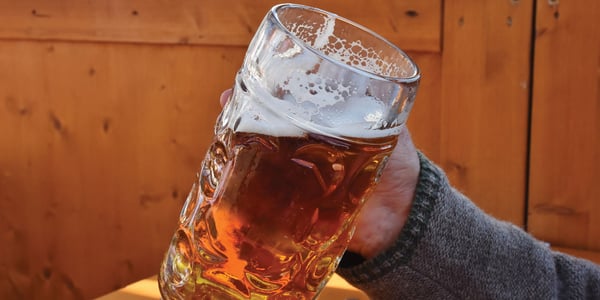 Not all beer in Germany is lager. Two styles in particular are still brewed with top fermenting yeast. Altbier [old beer] refers to the original brewing ingredients and methods of the region around Dusseldorf. Altbier is amber to brown in color, medium strength and slightly hoppy. The other contribution to the category is Kolsch, a golden ale from Cologne, also made with top fermenting yeast, fermented warmer than lagers, but cooled to the cellar and filtered bright.
Not all beer in Germany is lager. Two styles in particular are still brewed with top fermenting yeast. Altbier [old beer] refers to the original brewing ingredients and methods of the region around Dusseldorf. Altbier is amber to brown in color, medium strength and slightly hoppy. The other contribution to the category is Kolsch, a golden ale from Cologne, also made with top fermenting yeast, fermented warmer than lagers, but cooled to the cellar and filtered bright.
Rauchbier: Pils, Wheat, Bock, Doppelbock
Rauchbier [smoked beer] is made with beechwood kilned malt, giving the beer a smoky flavor. Traditionally made in Bamberg, the brewers make an array of styles with the signature smoky flavor, including Pils, Wheat Beer, Bock and Doppelbock.
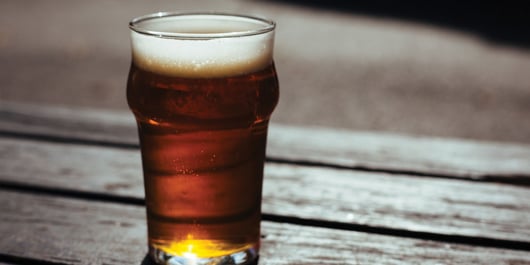
More Variations: Roggen, Kellerbier
Roggen, a beer made with rye malt, is usually dark amber, hoppy and spicy, using Wheat Beer yeast. Kellerbier literally means Cellar Beer, an unfiltered lager that is not pasteurized.

Check your beer color with the HI801 Spectrophotometer
The journey following beer around the world still has a few stops to make!
If you have questions regarding your beer testing, please contact us using one of the channels below.
Check out Part 4!
Did you miss Part 1 or Part 2? Click the buttons below to read them now!
[1] The Oxford Companion to Beer, Chris Holliland, 2011
[2,3,4] The World Guide to Beer, Michael Jackson, 1977
[5] Gruit Ales: Beer Before Hops, A. Sparhawk, Craft Beer.com, 2018
That's why we've dedicated our blog as a helpful resource for you to use! Catch up on the latest products, explore industry trends, discover testing tips, learn how to improve results, and more. Got questions? Email sales@hannainst.com.
